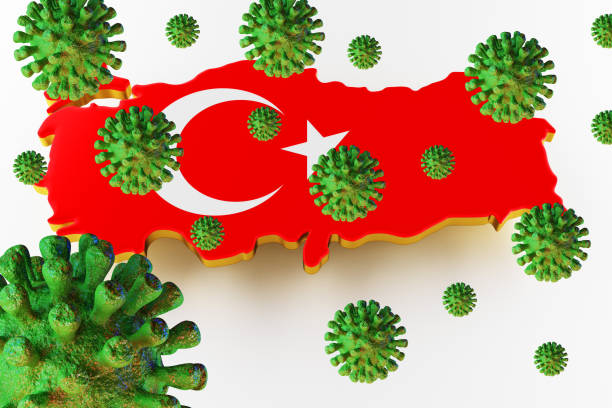Title: A Chronicle of Coronavirus: Tracing the Evolution and Impact of a Global Pandemic
In late 2019, a novel coronavirus emerged in the city of Wuhan, China, setting off a chain of events that would shape the course of history. The virus, later named SARS-CoV-2, was responsible for the coronavirus disease 2019 (COVID-19) pandemic, which would go on to affect every corner of the globe. This article delves into the multifaceted history of the coronavirus pandemic, from its origins and spread to the scientific advancements and societal changes it spurred.
Origins and Early Spread
The first cases of COVID-19 were linked to a seafood market in Wuhan, where live animals were also sold. The virus is believed to have jumped from animals to humans, similar to the original SARS virus. By the time Chinese authorities recognized the seriousness of the situation and alerted the World Health Organization (WHO) in December 2019, the virus had already gained a foothold beyond Wuhan.
By early 2020, COVID-19 cases were reported in multiple countries, sparking fears of a global pandemic. The virus's rapid transmission led to widespread lockdowns, travel restrictions, and a race to understand its genetic makeup.
Global Response and Health Systems Strain
As the virus spread, nations implemented various measures to slow transmission, including quarantines, social distancing, and mask mandates. These actions aimed to 'flatten the curve,' preventing healthcare systems from becoming overwhelmed.
However, the pandemic exposed vulnerabilities in global healthcare systems. Shortages of personal protective equipment (PPE), ventilators, and hospital beds strained medical resources. The desperate need for these supplies highlighted the importance of preparedness for future health crises.
Scientific Progress and Vaccine Development
In record time, scientists sequenced the virus's genome, enabling the development of diagnostic tests. Researchers around the world collaborated to understand the virus's behavior, transmission routes, and clinical manifestations. This unprecedented global scientific effort facilitated the rapid development of vaccines.
By late 2020, multiple vaccines had received emergency use authorization. These vaccines, including those developed by Pfizer-BioNTech, Moderna, and AstraZeneca, offered hope for controlling the pandemic. Mass vaccination campaigns were launched, but challenges arose in terms of equitable distribution, vaccine hesitancy, and supply chain issues.
Societal Transformation
The pandemic's effects reached beyond health systems, profoundly impacting societies, economies, and daily life. Remote work became the norm for many, accelerating the adoption of digital communication tools and changing the dynamics of the workplace. Educational institutions shifted to online learning, posing challenges for students, teachers, and parents.
Economically, businesses faced closures, bankruptcies, and supply chain disruptions. Governments introduced stimulus packages to mitigate financial hardships. The pandemic emphasized the need for resilient economies and diversified supply chains to withstand future shocks.
Infodemic and Misinformation
The digital age facilitated the rapid spread of information, but it also contributed to an "infodemic" of misinformation and conspiracy theories surrounding the virus. False cures, misleading statistics, and unfounded claims spread online, undermining public health efforts. Social media platforms worked to combat misinformation while balancing free speech concerns.
Towards a New Normal
As vaccines became more widely available, the prospect of returning to normalcy emerged. However, the path was fraught with challenges. New variants of the virus raised concerns about vaccine efficacy and the potential need for booster shots. Ongoing debates about vaccine passports, personal freedoms, and public health measures highlighted the complex ethical and societal dilemmas posed by the pandemic.
In conclusion, the coronavirus pandemic has been a defining event of the 21st century, reshaping global health, society, and economies. From its origins in Wuhan to its worldwide impact, the pandemic has revealed both the strengths and weaknesses of nations' response mechanisms. It has underscored the importance of international collaboration, scientific innovation, and adaptable systems to navigate and mitigate the impact of future crises. As the world continues to grapple with the ongoing effects of COVID-19, the lessons learned will shape the way forward for public health, governance, and society at large.
In late 2019, a novel coronavirus emerged in the city of Wuhan, China, setting off a chain of events that would shape the course of history. The virus, later named SARS-CoV-2, was responsible for the coronavirus disease 2019 (COVID-19) pandemic, which would go on to affect every corner of the globe. This article delves into the multifaceted history of the coronavirus pandemic, from its origins and spread to the scientific advancements and societal changes it spurred.
Origins and Early Spread
The first cases of COVID-19 were linked to a seafood market in Wuhan, where live animals were also sold. The virus is believed to have jumped from animals to humans, similar to the original SARS virus. By the time Chinese authorities recognized the seriousness of the situation and alerted the World Health Organization (WHO) in December 2019, the virus had already gained a foothold beyond Wuhan.
By early 2020, COVID-19 cases were reported in multiple countries, sparking fears of a global pandemic. The virus's rapid transmission led to widespread lockdowns, travel restrictions, and a race to understand its genetic makeup.
Global Response and Health Systems Strain
As the virus spread, nations implemented various measures to slow transmission, including quarantines, social distancing, and mask mandates. These actions aimed to 'flatten the curve,' preventing healthcare systems from becoming overwhelmed.
However, the pandemic exposed vulnerabilities in global healthcare systems. Shortages of personal protective equipment (PPE), ventilators, and hospital beds strained medical resources. The desperate need for these supplies highlighted the importance of preparedness for future health crises.
Scientific Progress and Vaccine Development
In record time, scientists sequenced the virus's genome, enabling the development of diagnostic tests. Researchers around the world collaborated to understand the virus's behavior, transmission routes, and clinical manifestations. This unprecedented global scientific effort facilitated the rapid development of vaccines.
By late 2020, multiple vaccines had received emergency use authorization. These vaccines, including those developed by Pfizer-BioNTech, Moderna, and AstraZeneca, offered hope for controlling the pandemic. Mass vaccination campaigns were launched, but challenges arose in terms of equitable distribution, vaccine hesitancy, and supply chain issues.
Societal Transformation
The pandemic's effects reached beyond health systems, profoundly impacting societies, economies, and daily life. Remote work became the norm for many, accelerating the adoption of digital communication tools and changing the dynamics of the workplace. Educational institutions shifted to online learning, posing challenges for students, teachers, and parents.
Economically, businesses faced closures, bankruptcies, and supply chain disruptions. Governments introduced stimulus packages to mitigate financial hardships. The pandemic emphasized the need for resilient economies and diversified supply chains to withstand future shocks.
Infodemic and Misinformation
The digital age facilitated the rapid spread of information, but it also contributed to an "infodemic" of misinformation and conspiracy theories surrounding the virus. False cures, misleading statistics, and unfounded claims spread online, undermining public health efforts. Social media platforms worked to combat misinformation while balancing free speech concerns.
Towards a New Normal
As vaccines became more widely available, the prospect of returning to normalcy emerged. However, the path was fraught with challenges. New variants of the virus raised concerns about vaccine efficacy and the potential need for booster shots. Ongoing debates about vaccine passports, personal freedoms, and public health measures highlighted the complex ethical and societal dilemmas posed by the pandemic.
In conclusion, the coronavirus pandemic has been a defining event of the 21st century, reshaping global health, society, and economies. From its origins in Wuhan to its worldwide impact, the pandemic has revealed both the strengths and weaknesses of nations' response mechanisms. It has underscored the importance of international collaboration, scientific innovation, and adaptable systems to navigate and mitigate the impact of future crises. As the world continues to grapple with the ongoing effects of COVID-19, the lessons learned will shape the way forward for public health, governance, and society at large.




